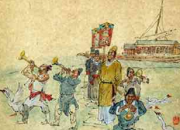经典英文读后感
时间:2021-08-31经典英文读后感
当品味完一本著作后,相信大家都积累了属于自己的'读书感悟,是时候静下心来好好写写读后感了。怎样写读后感才能避免写成“流水账”呢?以下是小编为大家收集的经典英文读后感,欢迎大家分享。
《小王子》英语读后感
This story’s name is “The little prince”。 As it known to all, we will encounter a lot of difficulties, even hardships. Different people may have different ways to deal with them. After reading The Little Princess, I am deeply impressed by Sara’s way to deal with difficulties. The Little Princess was written by Frances Hodgson Burnett, a famous novelist and dramatist. Sara, the heroine of the novel, was born in a rich family. In order to get a better education, her father took her from India to London so that she could go to the best school. Because Sara was kind-hearted, generous and most of all—rich, she was loved by everyone. All went well until her father died in an accident. Everything changed completely. She didn’t understand why the teachers and classmates treated her so badly. Even the principal who used to be fond of her, made her work 16 hours a day. Sara’s miserable life began.When I finished reading the book, I was shocked by what the unimaginable pain Sara had suffered after her father’s death. She used to be a happy, worriless, and rich Princess, but now she was a lonely and poor servant. She had to work very hard without any rest but only had little food. Besides she had to endure the unfriendly and even rude ways that her classmates treated her. All teachers and students in the school looked down upon her. The most important fact is that Sara had lost the love and care of her parents.What a mighty pain! If you were Sara, could you stand such pain? Needless to say, an 11 years old girl, even if it were an adult, he might not put up with it. But to my surprise, Sara faced it bravely.
Despite of the torture of the principal and all those pressures above, she still was optimistic towards life. By reading this novel, I felt inspired and think much. When we meet such difficulties, what should we do? Some people always complain that the fate is unfair to them. Some people can’t sustain the hardships and choose to give up. Few of them even try to commit suic ide because they lack the courage to overcome it. Compared with Sara—an eleven years old girl who can treat the pressure of life with optimistic spirit, these people’s performances are sounded so lamentable. Why can’t they make it?However, what impress me most are her characteristics and the thought of her “being a real princess.” This “real princess” does not mean luxury palaces, beautiful clothes and the apple of the others’ eyes, but being kind, generous and having good manners. It is unnecessary for “a real princess” to be strong in body, but she must be strong in will. Sara is a real princess in my heart all the time, whether she was rich and wore beautiful clothes in the classroom or she was cold and hungry in the attic, just because she had the good characters and kind heart. The story went on. Fortunately, a friend of Sara’s father found her and told her that her father left a great sum of money to her. I pray and believe that every good person in the world deserve a good result, and of course, we are the same.
《简爱》英语读后感
Jane Eyre, is a poor but aspiring, small in body but huge in soul, obscure but self-respecting girl. After we close the covers of the book, after having a long journey of the spirit, Jane Eyre, a marvelous figure, has left us so much to recall and to think:
We remember her goodness: for someone who lost arms and blinded in eyes, for someone who despised her for her ordinariness, and even for someone who had hurt her deeply in the past.
We remember her pursuit of justice. It’s like a companion with the goodness. But still, a virtuous person should promote the goodneon one side and must check the badneon the other side.
We remember her self-respect and the clear situation on equality. In her opinion, everyone is the same at the God’s feet. Though there are differences in status、in property and also in appearance, but all the human being are equal in personality.
We also remember her striving for life, her toughneand her confidence…
When we think of this girl, what she gave us was not a pretty face or a transcendent temperament that make us admire deeply, but a huge charm of her personality.
Actually, she wasn’t pretty, and of course, the ordinary appearance didn’t make others feel good of her, even her own aunt felt disgusted with it. And some others even thought that she was easy to look down on and to tease, so when MiIngram met Jane Eyre, she seemed quite contemptuous, for that she was obviously much more prettier than ‘the plain and ugly governess’. But as the little governehad said: ‘Do you think, because I am poor, obscure, plain, and little, I am soulleand heartless? You think wrong!’ This is the idea of equality in Jane Eyre’s mind. God hadn’t given her beauty and wealth, but instead, God gave her a kind mind and a thinking brain. Her idea of equality and self-respect impreus so much and let us feel the power inside her body.
In my mind, though a person’s beauty on the face can make others once feel that one is attractive and charming, if his or her mind isn’t the same beautiful as the appearance, such as beauty cannot last for, when others find that the beauty which had charmed them was only a falsity, it’s not true, they will like the person no more. For a long time, only a person’s great virtue, a noble soul, a beautiful heart can be called as AN EVERLASTING BEAUTY, just as Kahill Gibran has said, that ‘Beauty is a heart enflamed and a soul enchanted’. I can feel that how beauty really is, as we are all fleshly men, so we can’t distinguish whether a man is of nobleneor humbleness, but fleshly men, so we can’t distinguish whether a man is of nobleneor humbleness, but as there are great differences in our souls, and from that, we can know that whether a man is noble or ordinary, and even obscure, that is, whether he is beautiful or not.
Her story makes us thinking about life and we learn much from her experience, at least, that is a fresh new recognition of the real beauty.
《雾都孤儿》英语读后感
Here I am sitting on a couch alone, thinking about what I have just finished reading with tears of sadness filling my eyes and fire of indignation filling my heart, which revived my exhausted soul that has already been covered by the cruelty and the selfishness of the secular world for a long time. It is truly what I felt after reading Oliver Twist, written by the prominent British author Charles Dickens.
The resonance between me and the book makes me feel not only the kindness and the wickedness of all the characters in the novel, but what this aloof society lacks, and what I lack deep inside. These supreme resources I’m talking about right now are somewhat different from minerals, oil that we usually mention. They’re abstract like feelings, and some kinds of spiritual stimulation that all of us desire anxiously from one another —— love and care.
Those charitable figures whom Dickens created in the novel are really what we need in life. They showed love and care to others, just as the gentle rain from the sky fell upon the earth, which was carved into my heart deeply.
Mr. Brownlow is one such person.
The other day he had one of his elaborate watches stolen by two skilled teenage thieves, Artful Dodger and Charley Bates, and thought naturally it was Oliver, who was an orphan and forced to live with a gang of thieves, that had done it because he was the only one near by after the theft had taken place. Being wrathful, he caught Oliver, and sent him to the police station where the ill-tempered, unfair magistrates worked. Fortunately for him, Oliver was proved innocent by one onlooker afterwards. With sympathy, Mr. Brownlow took the injured, poor Oliver to his own home. There Oliver lived freely and gleefully for some months as if he were Mr. Brownlow’s own son. One day, however, Mr. Brownlow asked Oliver to return some books to the bookseller and to send some money for the new books that he had already collected. The thief Oliver once stayed with kidnapped him. After that he disappeared in Mr. Brownlow’s life. Searching for a while, Mr. Brownlow had to believe the fact that he had run away with his money. But dramatically, they came across each other again a few years later. Without hesitation, Mr. Brownlow took Oliver home for the second time not caring if he had done something evil.
Perhaps most of us would feel confused about Mr. Brownlow’s reaction. But as a matter of fact, this is just the lesson we should learn from him. Jesus said in the Bible. “Forgive not seven times, but seventy-times seven.” Why is that? Because forgiveness is our ability to remove negative thoughts and neutralize them so our energy may be spent on doing what we came here for. We cannot move forward in our future if past issues cloud our thinking. Stop put Mr. Brownlow into the list of your models. Always give people a second chance no matter what they might have done. That’s also a substantial part of loving and caring others.
Charles Dickens said:“Love makes the world go around.” These immortal words have inspired and will keep on inspiring us to chant the melody of love and to say the prayer of care forevermore. Let us, therefore, enjoy life and treat other people lovingly. These principles are the roots and foundations of beliefs supporting this article and our mission together.
【经典英文读后感】相关文章:
1.伤感英文经典好句
6.经典的英文谚语
7.经典英文谚语
8.经典英文谚语精选











